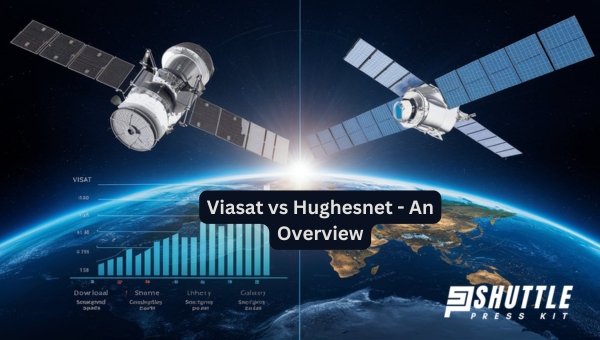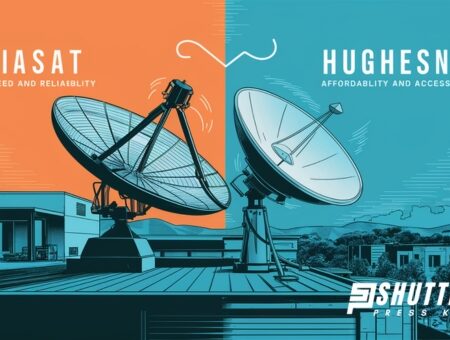When it comes to picking a satellite internet provider, “Viasat vs Hughesnet” is a debate you can’t ignore. I’ve been in your shoes, spending hours comparing the two to find the best fit for my home.
Are you tired of slow internet speeds? Or perhaps you’re in a rural area with limited options? Stick around. I’ll break down the pros and cons of both Viasat vs Hughesnet to help you make an informed choice. Trust me; your decision can greatly impact your daily life!
| Feature | Viasat | HughesNet |
|---|---|---|
| Monthly Price | $99.99 – $119.99 | $49.99 – $94.99 |
| Max Download Speed | Up to 150 Mbps | 50 – 100 Mbps |
| Data Allowance | Unlimited (with soft caps on some plans) | 100 – 200 GB (with soft caps) |
| Contract Requirement | No contract required | 24-month contract required |
| Customer Satisfaction | 3.1/5 | 2.9/5 |
| Pros | – Faster speeds | – More affordable plans |
| – No contracts | – Low-latency Fusion plan | |
| – Unlimited data options | – Unlimited standard data | |
| Cons | – Prices vary by region | – Lower speeds |
| – Speeds vary by region | – Deprioritized connection when data runs out | |
| Best For | High-speed internet needs | Budget-conscious users |
Viasat vs Hughesnet – An Overview
Viasat and HughesNet are two of the leading satellite internet providers, each offering unique benefits for rural and remote customers where traditional broadband is not an option.

Viasat, known for higher top speeds and various data plans, typically provides faster internet service with plans that can reach up to 100 Mbps, making it suitable for streaming, online gaming, and heavy internet use. It offers a range of plans tailored to different usage needs, which can be adjusted based on the priority data allowance.
On the other hand, HughesNet offers a simpler selection of plans with a focus on consistency rather than speed. All HughesNet plans come with a standard 25 Mbps download speed, but differ primarily in the amount of high-speed data they provide each month.
After the data cap is reached, speeds are drastically reduced, though the service remains active. This provider is often chosen for its more straightforward offerings and consistent pricing structure, which can be ideal for users with predictable, moderate internet needs.
Also Read: Amazon’s Project Kuiper vs Starlink: Showdown Unpacked
Price
When comparing satellite internet providers, price is a significant factor. HughesNet typically offers lower monthly rates, ranging from $49.99 to $94.99, making it an appealing choice for budget-conscious consumers. In contrast, Viasat’s plans start at approximately $99.99 and can go up to $119.99.
While HughesNet may seem more affordable, potential users should consider the trade-off in speed and data allowances.
Viasat provides higher data caps and faster speeds, which may justify the higher cost for users with more demanding internet needs. Ultimately, the choice between the two will depend on individual budget constraints and internet usage requirements.
Speed
Speed is a critical aspect when evaluating Viasat and HughesNet. Viasat offers download speeds ranging from 12 Mbps to a maximum of 150 Mbps, making it suitable for bandwidth-intensive activities like streaming and gaming.
In contrast, HughesNet provides speeds between 50 and 100 Mbps, which may suffice for general browsing and light streaming but can fall short for multiple users or high-demand applications.
The difference in speed can significantly impact user experience, especially in households with multiple devices. For those prioritizing high-speed internet, Viasat is the preferred option, while HughesNet may be adequate for lighter usage scenarios.
Reliability
In terms of reliability, both Viasat vs HughesNet have their strengths and weaknesses. HughesNet is often praised for its consistent performance, particularly in rural areas where other options may be limited.
However, Viasat, while offering faster speeds, can experience variability in service quality based on location and weather conditions. Both providers utilize geostationary satellites, which can introduce latency issues, affecting real-time applications like video calls or online gaming.
Users in remote areas may find HughesNet’s service more dependable, while those needing higher speeds may prefer Viasat despite potential reliability fluctuations.
Coverage
Coverage is another crucial consideration when choosing between Viasat and HughesNet. Both providers boast extensive coverage across the United States, reaching over 99% of the population, making them viable options for rural and underserved areas.
HughesNet is particularly known for its ability to serve remote locations effectively, ensuring that users have access to internet services that traditional providers may not reach.
Viasat also offers substantial coverage, but its effectiveness can vary based on specific geographic locations and environmental factors. For users in very rural areas, HughesNet may be the more reliable choice, while Viasat can provide faster speeds in regions where it operates optimally.
Also Read: Starlink’s Rivals and Competitors: Who’s Challenging SpaceX?
Which offers faster speeds, Viasat or HughesNet?
Viasat often provides higher speeds compared to HughesNet, making it a preferred choice for heavy internet users.
Are Viasat and HughesNet available everywhere?
Yes, both Viasat and HughesNet offer nationwide coverage, making them excellent options for rural or remote areas with limited internet choices.
Which service is better for streaming, Viasat or HughesNet?
Due to its generally higher speeds, Viasat is often better suited for consistent streaming of video content than HughesNet.
Can I expect data limits with both Viasat vs HughesNet?
Yes, both providers implement data caps, but the way these caps affect your service may vary between the two, with some plans offering more flexibility or higher thresholds.
Also Read: Starlink vs HughesNet: Which Wins the Satellite Battle?
Conclusion
When it comes to choosing between Viasat and HughesNet for your satellite internet provider, the decision boils down to your specific needs and usage habits.
Viasat offers higher data plans and faster speeds, making it a solid choice for households with heavier internet usage or those who value speed.
HughesNet, on the other hand, offers a more straightforward pricing model and consistently enforced data caps, potentially making it a better option for users with predictable internet needs and a focus on budgeting.
